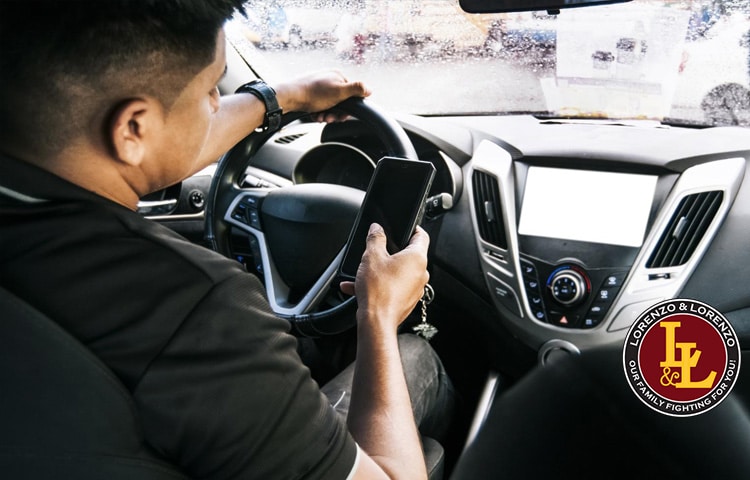Here at Lorenzo & Lorenzo, we believe it’s essential to support and invest in our community through goodwill actions that help people live better lives. We’ve long had a passion for providing opportunities for those pursuing higher education, which is why we offer an annual scholarship to help remove some of the barriers to paying for college.
Texting and driving has become a major cause of car accidents in Florida and throughout the country. In fact, according to texting and driving statistics provided by the National Highway Traffic Safety Administration (NHTSA), in 2020 alone, 3,142 people in the U.S. needlessly lost their lives as a result of distracted driving.
To help bring awareness to this important issue, we decided to make it the topic of this year’s essay contest. So we asked students to write a thoughtful response to the following prompt:
Florida updated their texting and driving laws in 2020. Please assess the new laws, how the new laws impact drivers, and if you believe this law will be beneficial for driver safety.
After reviewing all the submissions, we’re pleased to announce that we’ve chosen a winner—Hannah Neymeyer from Concordia University Wisconsin. Congratulations, Hannah!
Here’s her winning essay:
Texting & Driving: Stricter Laws Save Lives
Technology was originally created to bring promise and advancement to society, but from it a new weapon was created in the form of texting and driving. The only way to combat distracted driving is to add stricter restrictions to cell phone usage while driving, which is what Florida has done with its new 2020 texting and driving laws. The laws signed into effect by the governor of Florida made texting and driving a primary offense, allowing law officers to pull over and issue tickets to drivers solely for texting and driving (City of Miami Springs Florida, 2019). Before the addition of this law the use of cellular devices while driving was only a secondary offense, meaning a driver could only get cited for texting and driving if they violate a primary offense (City of Miami Springs Florida, 2019). The other addition to the Florida texting and driving laws is the ban of using handheld wireless communication devices while in a school or work zone (FLHSMV, 2021). These two new laws will help restrict the use of cellular devices while driving which in return will reduce the number of accidents caused by texting and driving.
The impact of restricting of the use of cellular devices while operating a vehicle will change the way Florida drivers view safety. The new laws impact how drivers interact with their phones while driving. While it is known that texting and driving is not safe, many drivers still do it out of either habit or just because. The potential to be fined for sending texts or using handheld devices in certain zones impact drivers’ habits through causing them to be more aware that their actions have direct consequences. This new standard of safety ultimately protects the driver from injuring not only themselves, but also other drivers on the road. Floridan drivers must now change their potentially dangerous driving habits or face fines and other consequences.
The new texting and driving laws for Florida will be beneficial for driver safety in the long run as it promotes safe driving. These laws are a great stride closer to the regulation of cellular devices while operating a vehicle. The temptation to use cellular devices while driving for many are too high with the consequences being too low, by adding stricter laws it causes drivers to consider the consequences. These laws are needed due to the danger involved with distracted driving, “In 2019, 3,142 people were killed in motor vehicle crashes involving distracted drivers” (NHTSA, 2019). The addition of stricter texting and driving laws in Florida will not only be beneficial for driver safety but it is a necessary step towards reducing deaths caused by distracted driving.
References
City of Miami Springs Florida. (2019). New Florida law makes texting while driving a primary offense. City of Miami Springs Florida. Retrieved January 4, 2022, from https://www.miamisprings-fl.gov/police/new-florida-law-makes-texting-while-driving-primary-offense
FLHSMV. (2021, September 27). Put it down: Focus on driving. Florida Department of Highway Safety and Motor Vehicles. Retrieved January 4, 2022, from https://www.flhsmv.gov/safety-center/driving-safety/distracted-driving/
NHTSA. (2019). Distracted driving. NHTSA. Retrieved January 4, 2022, from https://www.nhtsa.gov/risky-driving/distracted-driving#resources
About the winner
Hannah Neymeyer is a junior at Concordia University Wisconsin, where she’s pursuing a Bachelor of Science degree in computer science with a double minor in management and cyber security. Outside of academics, she enjoys playing basketball for her college team and working multiple jobs to pay for school. She tells us that stopping texting and driving is something she’s passionate about because she’s seen how dangerous it can be through her peers.
Check back soon to enter our next essay contest
Congratulations, Hannah, on your winning essay, and thank you to everyone who participated in our scholarship essay contest!
If you missed the deadline for this contest or would like to apply for a future scholarship, please visit our scholarship page to review the prompt question, eligibility criteria, deadline and application instructions. Good luck!








